Moudle8 Sports life词汇短语句型精讲 课件(共43张PPT)
文档属性
| 名称 | Moudle8 Sports life词汇短语句型精讲 课件(共43张PPT) |  | |
| 格式 | pptx | ||
| 文件大小 | 14.1MB | ||
| 资源类型 | 教案 | ||
| 版本资源 | 外研版 | ||
| 科目 | 英语 | ||
| 更新时间 | 2021-07-21 08:18:35 | ||
图片预览

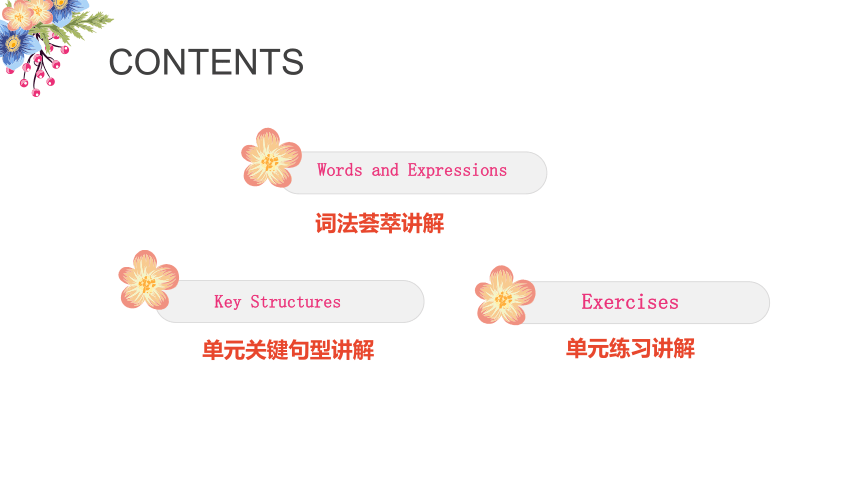
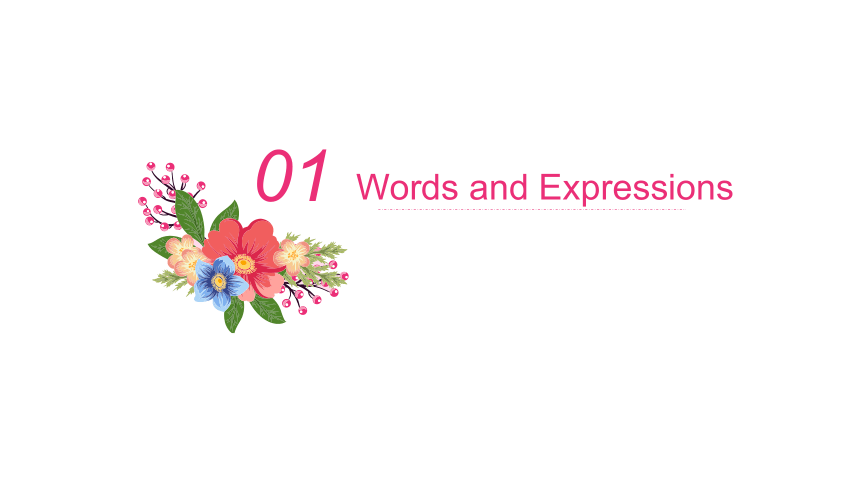
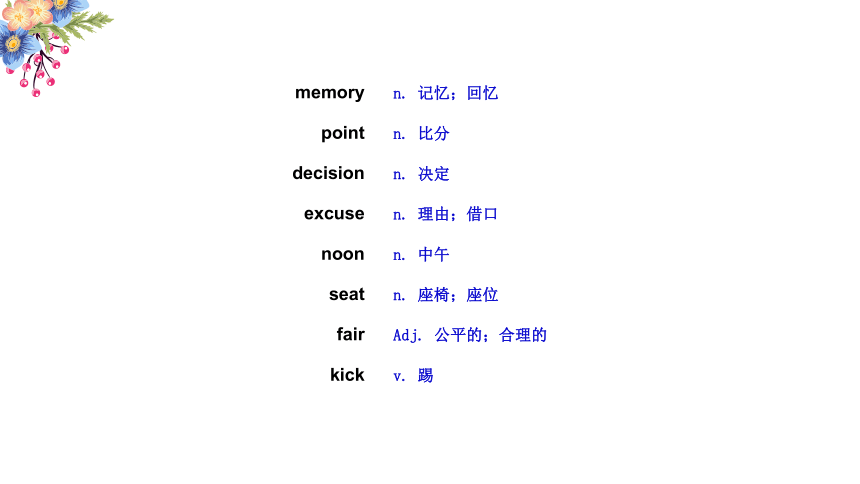
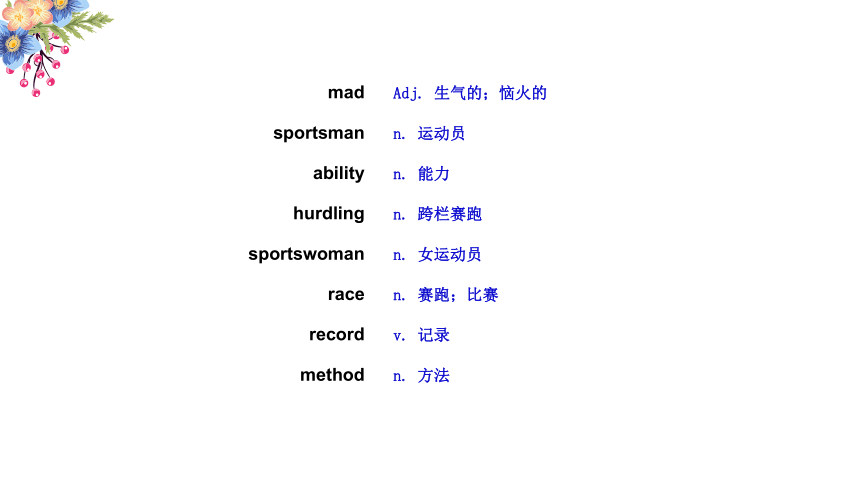
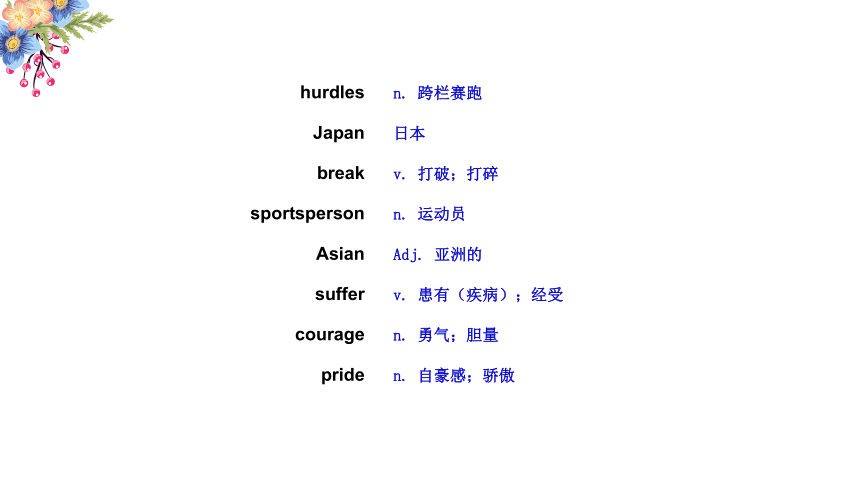
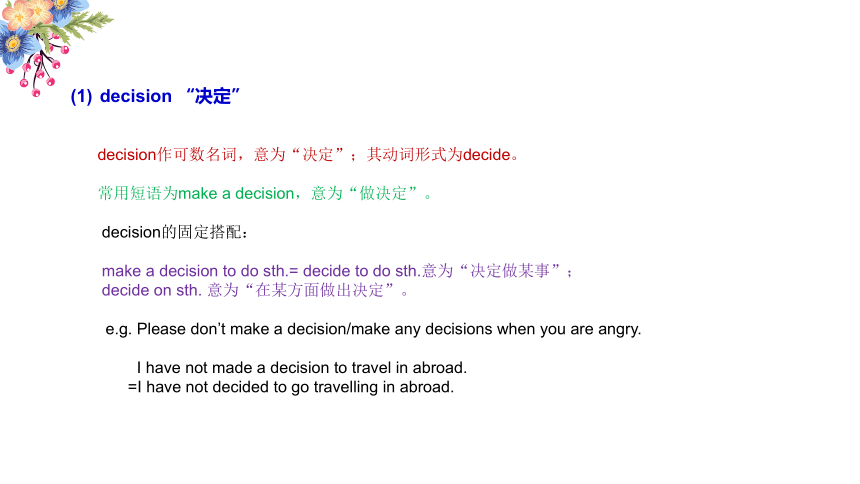

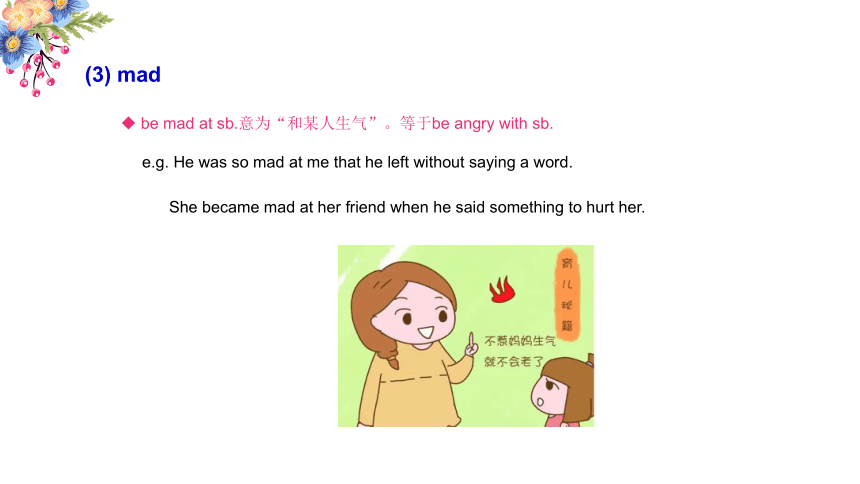
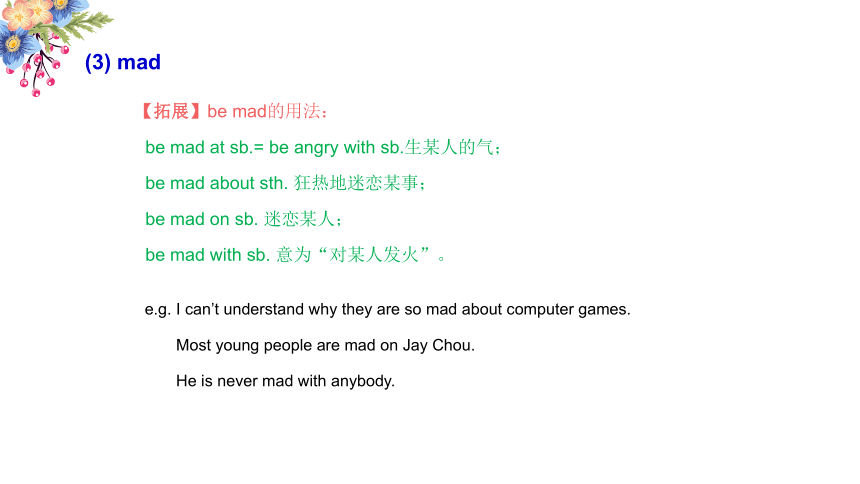

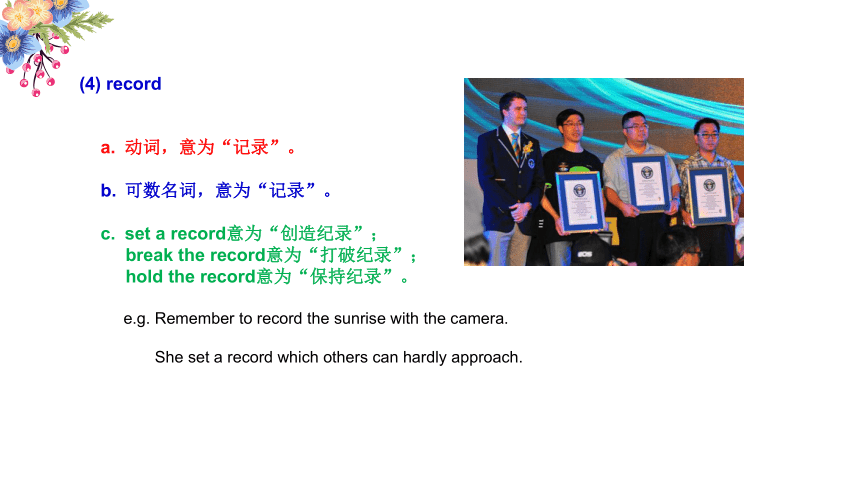
文档简介
(共43张PPT)
Module 8
Sports Life
外研版9年级上册
词法荟萃讲解
Words and Expressions
单元关键句型讲解
Key Structures
CONTENTS
Exercises
单元练习讲解
01
Words and Expressions
memory
point
decision
excuse
noon
seat
fair
kick
n. 记忆;回忆
n. 比分
n. 决定
n. 理由;借口
n. 中午
n. 座椅;座位
Adj. 公平的;合理的
v. 踢
mad
sportsman
ability
hurdling
sportswoman
race
record
method
Adj. 生气的;恼火的
n. 运动员
n. 能力
n. 跨栏赛跑
n. 女运动员
n. 赛跑;比赛
v. 记录
n. 方法
hurdles
Japan
break
sportsperson
Asian
suffer
courage
pride
n. 跨栏赛跑
日本
v. 打破;打碎
n. 运动员
Adj. 亚洲的
v. 患有(疾病);经受
n. 勇气;胆量
n. 自豪感;骄傲
decision “决定”
decision作可数名词,意为“决定”;其动词形式为decide。
常用短语为make a decision,意为“做决定”。
decision的固定搭配:
make a decision to do sth.= decide to do sth.意为“决定做某事”;
decide on sth. 意为“在某方面做出决定”。
e.g. Please don’t make a decision/make any decisions when you are angry.
I have not made a decision to travel in abroad.
=I have not decided to go travelling in abroad.
(2) excuse “理由;借口”
a. 名词,意为“(辩解的)理由;借口”。
常用搭配 an excuse for...意为“……的借口”;
make excuse意为“辩解;找借口”;
b. 动词,意为“原谅;宽恕”。
e.g. Her excuse didn’t go down well, no one believe it.
I will excuse you this time.
(3) mad
be mad at sb.意为“和某人生气”。等于be angry with sb.
e.g. He was so mad at me that he left without saying a word.
She became mad at her friend when he said something to hurt her.
(3) mad
【拓展】be mad的用法:
be mad at sb.= be angry with sb.生某人的气;
be mad about sth. 狂热地迷恋某事;
be mad on sb. 迷恋某人;
be mad with sb. 意为“对某人发火”。
e.g. I can’t understand why they are so mad about computer games.
Most young people are mad on Jay Chou.
He is never mad with anybody.
(4) ability
ability是名词,意为“能力,才能”;
反义词是inability意为“无能力,无能为力”。
常用搭配one’s ability in... 意为“某人在……方面的能力”;
the ability to do sth. 意为“做某事的能力”;
to the best of one’s ability意为“竭尽全力”。
e.g. I don’t have the ability to say “no”.
(4) record
动词,意为“记录”。
可数名词,意为“记录”。
set a record意为“创造纪录”;
break the record意为“打破纪录”;
hold the record意为“保持纪录”。
e.g. Remember to record the sunrise with the camera.
She set a record which others can hardly approach.
(5) method
可数名词,意为“方法,办法”;
常用搭配a method of doing sth.意为“做某事的方法”;
with this method意为“用这种方法”。
e.g. He invented a new method of teaching English.
We found a new method of solving the problem.
(5) suffer “经受; (患有)疾病”
suffer是动词,意为“患有(疾病);经受”;其名词形式为sufferring,意为“痛苦;折磨”。
suffer from意为“受(某种病痛)折磨,因……而受苦”,强调原因,后跟表示疾病 的名词或表示不愉快事情的名词。
e.g. He suffers from headache all day long.
This kind of medicine can stop many people suffering from cancer.
This war has caused wide-spread human sufferring.
(6) pride n. 自豪感;骄傲
take pride in意为“以……为骄傲/自豪;为……感到自豪”,其同义短语为be proud of;
the pride of sth.意为“值得骄傲的事”
e.g. I take pride in my hometown.
My mother takes pride in me.
The mother takes great pride in / is very proud of her children’s success.
stand for
no way
high jump
suffer from
first place
stop sb.(from) doing sth.
take pride in
代表
绝不;不可能
跳高
患有…疾病;遭受
第一名;冠军
阻止某人做某事
感到自豪
train for the big match
play against
beat sb
face the truth
remember to do sth.
cheer for sb. be invited to do sth.
be encouraged to do sth.
set up
为重大比赛做训练
与……比赛,与……对抗;对打
打败某人
面对现实
记得去做某事(事情还没有做)
为某人喝彩
被邀请去做某事;被鼓励做某事
建立;设立
be compared with...
use ... to do sth.
the 110m hurdles race
at the same time
break the Olympic Games record
in fact
from 2008 on
return to
It is a pity that…
被与……比较
用……做某事
110米跨栏
同时
打破奥运纪录
事实上,实际上
从2008年起
返回到,归还
……是件遗憾的事
a symbol of
continue to do sth.
a number of
take up
advise sb. to do sth.
go on
……的标志;
继续做某事;
许多;
占据(时间或空间);
建议某人做某事。
继续;
well done
fall down
prepare for sth.
get no chance of doing sth. too...to...
first of all
go for it
做得好;
摔倒;跌倒;
为某事做准备;
没有做某事的机会;
太……而不能;
首先;
好好争取
stand for“代表”
stand for与represent的用法辨析:
① stand for意为“代表,象征,是……的缩写,意味着”;
其同义词为be short for或represent。不用于被动语态,也不用于进行时态。
stand for还可表示“支持;倡导;拥护”,相当于support。
e.g. GMT stands for Greenwich Mean Time. GMT表示格林尼治平均时间。
NBA stands for National Basketball Association.
John always stands for what is right.
stand for“代表”
stand for与represent的用法辨析:
② represent多用来指“代表(某人或某团体)”,多指实体代表。
e.g. He represented our school to take part in the competition.
Mr. Green was chosen to represent the company at the meeting.
stop sb. from doing sth. “阻止某人做某事”
同义短语:keep sb./sth. from doing sth.或 prevent sb./sth. from doing sth.。
e.g. I couldn’t stop myself (from) laughing.
We were prevented/stopped/kept from entering the meeting room.
The policeman stopped the children (from) playing football in the street.
02
Key structures
Who are you playing against 你们和哪个队比赛?
play against...意为“与……比赛/对抗”。
against是介词,意为“与……相反/相对;反对;违背”,通常与be连用,短语be against意为“反对”。
其反义词为be for意为“赞成”。
e.g. Our team played against Class Three.
The soldiers fought against the enemies fiercely.
Are you against or for this plan
Didn’t they beat you last time 上次比赛中他们不是把你们打败了吗?
【辨析】beat与win的用法辨析:
① beat意为“战胜;打败”,常指在游戏、比赛中打败对手,其宾语一般是人、队名、国家等。
e.g. We beat them at chess.
They beat all the other teams and won the match.
② win意为“赢,获胜”,其宾语通常是比赛、战争、奖杯、奖项、名次 (win a race/ a game/ a match/ a war/a prize/a gold medal) 等。win后不能接表示某人或某队伍的单词或短语。
e.g. Our team won the football match yesterday.
Mike won first prize in the surfing competition.
Remember to throw the ball, not knick it, Tony! 记住要传球,而不是踢球,托尼!
【辨析】remember to do sth.与remember doing sth.的用法辨析:
① remember to do sth. 意为“记得去做某事”(事情还没有做)。
e.g. Please remember to send the letter for me. (信还没有发)
Remember to turn off the lights when you leave the room. (还没有关灯)
② remember doing sth. 意为“记得做过某事”(事情已经做了)。
e.g. I remembered turning off the lights when I left the room. (记忆中灯已经关了)
Don’t you remember telling me the story yesterday (故事已讲过)
We’ll be there to cheer for them. 我们一定到场为他们加油。
cheer for意为“为/给……加油/助威/欢呼”。
与cheer有关的搭配:
cheer sb. on意为“(在比赛中)为某人加油”;
cheer (sb.) up意为“(使某人)高兴起来”。
e.g. The audience were shouting and cheering for him.
Here is a piece of news that will cheer you up.
Liu Xiang was not a successful sportsman at first. 一开始刘翔并不是一名成功的运动员。
successful是形容词,意为“成功的”,常用搭配be successful in...意为“在……方面成功”
success是名词,意为“成功的事或人;成功,胜利”(既可做可数名词,意为“成功的事或人”,也可做不可数名词,意为“成功,胜利”)。
successfully是副词,意为“成功地”。
succeed是动词,意为“成功”,常用搭配be succeed in doing sth.意为“成功做成某事”。
e.g. If you really want to be a successful musician, just go for it!
The movie was a great success.
Liu was encouraged at first to train for the high jump. 期初,刘被鼓励训练调高。
be encouraged to do sth. 意为“被鼓励做某事”,是被动语态;
encourage作动词,意为“鼓励;激励”,其过去式和过去分词均为encouraged,现在分词为encouraging;常用短语为encourage sb. to do sth. 意为“鼓励某人做某事”。
e.g. I was encouraged to work hard and prepare for the exam carefully.
Ms Wang always encourages us to speak English in class.
In 2001, a special programme was set up to help young sportsmen and sportswomen. 2001年创立了一个特殊的项目,用来帮助年轻运动员。
set up动词短语,意为“设立;创办”,set up既可指建立某种物体,也可指成立某个组织。
e.g. She plans to set up her own company.
A new government was set up after the war.
In 2001, a special programme was set up to help young sportsmen and sportswomen. 2001年创立了一个特殊的项目,用来帮助年轻运动员。
【辨析】set up,found与build的用法辨析:
① set up意为“设立;创办”,set up与found同义,常常和表示组织、机构、团体、国家等意义的 名词连用,但是found更着重“打基础”。
e.g. The government set up a working party to look into the problem.
They founded a school for the blind.
②build意为“建设,建造”,是最普通的用词,常指房屋、桥梁、道路等,也可用于广义。
e.g. They built many buildings in the city.
We are building socialism with China’s style.
It is a pity that his foot problem stopped him from completing the 2012 London Olympic Games. 遗憾的是,他的脚伤阻止了他完成2012年伦敦奥运会。
it’s a pity that ...意为“很遗憾……;遗憾的是……”,其中it是形式主语,真正的主语是that从句, that从句常用一般过去时。
e.g. It’s a pity that he didn’t accept the job.
It’s a pity that he didn’t see the movie yesterday.
But he is still a symbol of courage and success, and we continue to take great pride in him. 但是他仍然是勇气和成功的象征,并且我们继续以他为骄傲。
a symbol of意为“……的标志/象征”。
e.g. The dove is a symbol of peace.
continue to do sth.与continue doing sth.的用法辨析:
① continue to do sth. 意为“继续去做某事”。表示继续去做与目前所做的事情不同的另一件事情。
e.g. I continued to write my book when I had finished my homework.
After reading Lesson Nine,he continued to read Lesson Ten。
② continue doing sth. 意为“继续做原来的事”。
e.g. He continued reading Lesson Ten.
I continued writting my book after a short rest.
What method(s) do the sportspersons use to prepare for the Olympic Games 运动员们用什么方法为奥运会做准备。
prepare for sth.意为“为某事做准备”,宾语表示准备的目的;
e.g. How do I prepare for the exam
【拓展】prepare的常用搭配:
prepare to do sth.意为“准备做某事”;
prepare sth. for sb.相当于prepare sb. sth.意为“为某人做准备某物”。
e.g. Henry is preparing to leave for Australia.
Her mother prepared her a birthday present.
= Her mother prepared a birthday present for her.
03
Exercise
1. Tony thinks it is easy _________ English.
study B. learns C. to learn D. studies
2. Many trees must _______ every year.
A. plant B. be planted C. have been planted D. have planted
3. Now telephones are very popular and they are much ______ than before.
A. cheap B. cheaper C. cheapest D. the cheapest
4. I won’t come to the party unless you ______, too.
A. will invite B. invites C. invited D. are invited
5. Look ! _________ students are doing morning exercises on the playground .
A. thousands of B. thousand of C. two thousands D. two thousands of
6. Stamps are used for ______ letters.
A. send B. to send C. sending D. sent
7. The sports meeting _________next month.
A. will hold B. is going to hold C. will be held D.holds
8. –It’s difficult for the village children to cross the river for school.
– I think a bridge _________ over the river.
A. was built B. is being built C. should be built D. has been built
9. The handbag was made ______ by the women.
A. in hand B. with hand C. by hand D. by hands
10. — What do you think of the song “You and Me”?
— It ________ great. I love singing it.
A. tastes B. looks C. smells D. sounds
11. Please _____ your homework ______ before you hand it in.
A. look; for B. look; after C. look; out D. look; through
12. My bike is broken. Could you help me to ____
A. fix it up B. set it up C. make it up D. put it up
13. My cousin told me that he could eat three big apples ____.
A. at time B. at a time C. sometime D. some times
14. –Where is your dictionary, Yu Mei
–Oh, I _____ it to Amy yesterday. She will return it tomorrow.
A. showed B. lent C. had D. borrowed
15. -- It's too hot today.
--- Yes. Why don't you ________ your jacket
A. put on B. put up C. take off D. take after
1. Tony thinks it is easy _________ English.
study B. learns C. to learn D. studies
2. Many trees must _______ every year.
A. plant B. be planted C. have been planted D. have planted
3. Now telephones are very popular and they are much ______ than before.
A. cheap B. cheaper C. cheapest D. the cheapest
4. I won’t come to the party unless you ______, too.
A. will invite B. invites C. invited D. are invited
5. Look ! _________ students are doing morning exercises on the playground .
A. thousands of B. thousand of C. two thousands D. two thousands of
C
B
B
D
A
6. Stamps are used for ______ letters.
A. send B. to send C. sending D. sent
7. The sports meeting _________next month.
A. will hold B. is going to hold C. will be held D.holds
8. –It’s difficult for the village children to cross the river for school.
– I think a bridge _________ over the river.
A. was built B. is being built C. should be built D. has been built
9. The handbag was made ______ by the women.
A. in hand B. with hand C. by hand D. by hands
10. — What do you think of the song “You and Me”?
— It ________ great. I love singing it.
A. tastes B. looks C. smells D. sounds
C
C
C
C
D
11. Please _____ your homework ______ before you hand it in.
A. look; for B. look; after C. look; out D. look; through
12. My bike is broken. Could you help me to ____
A. fix it up B. set it up C. make it up D. put it up
13. My cousin told me that he could eat three big apples ____.
A. at time B. at a time C. sometime D. some times
14. –Where is your dictionary, Yu Mei
–Oh, I _____ it to Amy yesterday. She will return it tomorrow.
A. showed B. lent C. had D. borrowed
15. -- It's too hot today.
--- Yes. Why don't you ________ your jacket
A. put on B. put up C. take off D. take after
D
A
B
B
C
感谢您的观看
Module 8
Sports Life
外研版9年级上册
词法荟萃讲解
Words and Expressions
单元关键句型讲解
Key Structures
CONTENTS
Exercises
单元练习讲解
01
Words and Expressions
memory
point
decision
excuse
noon
seat
fair
kick
n. 记忆;回忆
n. 比分
n. 决定
n. 理由;借口
n. 中午
n. 座椅;座位
Adj. 公平的;合理的
v. 踢
mad
sportsman
ability
hurdling
sportswoman
race
record
method
Adj. 生气的;恼火的
n. 运动员
n. 能力
n. 跨栏赛跑
n. 女运动员
n. 赛跑;比赛
v. 记录
n. 方法
hurdles
Japan
break
sportsperson
Asian
suffer
courage
pride
n. 跨栏赛跑
日本
v. 打破;打碎
n. 运动员
Adj. 亚洲的
v. 患有(疾病);经受
n. 勇气;胆量
n. 自豪感;骄傲
decision “决定”
decision作可数名词,意为“决定”;其动词形式为decide。
常用短语为make a decision,意为“做决定”。
decision的固定搭配:
make a decision to do sth.= decide to do sth.意为“决定做某事”;
decide on sth. 意为“在某方面做出决定”。
e.g. Please don’t make a decision/make any decisions when you are angry.
I have not made a decision to travel in abroad.
=I have not decided to go travelling in abroad.
(2) excuse “理由;借口”
a. 名词,意为“(辩解的)理由;借口”。
常用搭配 an excuse for...意为“……的借口”;
make excuse意为“辩解;找借口”;
b. 动词,意为“原谅;宽恕”。
e.g. Her excuse didn’t go down well, no one believe it.
I will excuse you this time.
(3) mad
be mad at sb.意为“和某人生气”。等于be angry with sb.
e.g. He was so mad at me that he left without saying a word.
She became mad at her friend when he said something to hurt her.
(3) mad
【拓展】be mad的用法:
be mad at sb.= be angry with sb.生某人的气;
be mad about sth. 狂热地迷恋某事;
be mad on sb. 迷恋某人;
be mad with sb. 意为“对某人发火”。
e.g. I can’t understand why they are so mad about computer games.
Most young people are mad on Jay Chou.
He is never mad with anybody.
(4) ability
ability是名词,意为“能力,才能”;
反义词是inability意为“无能力,无能为力”。
常用搭配one’s ability in... 意为“某人在……方面的能力”;
the ability to do sth. 意为“做某事的能力”;
to the best of one’s ability意为“竭尽全力”。
e.g. I don’t have the ability to say “no”.
(4) record
动词,意为“记录”。
可数名词,意为“记录”。
set a record意为“创造纪录”;
break the record意为“打破纪录”;
hold the record意为“保持纪录”。
e.g. Remember to record the sunrise with the camera.
She set a record which others can hardly approach.
(5) method
可数名词,意为“方法,办法”;
常用搭配a method of doing sth.意为“做某事的方法”;
with this method意为“用这种方法”。
e.g. He invented a new method of teaching English.
We found a new method of solving the problem.
(5) suffer “经受; (患有)疾病”
suffer是动词,意为“患有(疾病);经受”;其名词形式为sufferring,意为“痛苦;折磨”。
suffer from意为“受(某种病痛)折磨,因……而受苦”,强调原因,后跟表示疾病 的名词或表示不愉快事情的名词。
e.g. He suffers from headache all day long.
This kind of medicine can stop many people suffering from cancer.
This war has caused wide-spread human sufferring.
(6) pride n. 自豪感;骄傲
take pride in意为“以……为骄傲/自豪;为……感到自豪”,其同义短语为be proud of;
the pride of sth.意为“值得骄傲的事”
e.g. I take pride in my hometown.
My mother takes pride in me.
The mother takes great pride in / is very proud of her children’s success.
stand for
no way
high jump
suffer from
first place
stop sb.(from) doing sth.
take pride in
代表
绝不;不可能
跳高
患有…疾病;遭受
第一名;冠军
阻止某人做某事
感到自豪
train for the big match
play against
beat sb
face the truth
remember to do sth.
cheer for sb. be invited to do sth.
be encouraged to do sth.
set up
为重大比赛做训练
与……比赛,与……对抗;对打
打败某人
面对现实
记得去做某事(事情还没有做)
为某人喝彩
被邀请去做某事;被鼓励做某事
建立;设立
be compared with...
use ... to do sth.
the 110m hurdles race
at the same time
break the Olympic Games record
in fact
from 2008 on
return to
It is a pity that…
被与……比较
用……做某事
110米跨栏
同时
打破奥运纪录
事实上,实际上
从2008年起
返回到,归还
……是件遗憾的事
a symbol of
continue to do sth.
a number of
take up
advise sb. to do sth.
go on
……的标志;
继续做某事;
许多;
占据(时间或空间);
建议某人做某事。
继续;
well done
fall down
prepare for sth.
get no chance of doing sth. too...to...
first of all
go for it
做得好;
摔倒;跌倒;
为某事做准备;
没有做某事的机会;
太……而不能;
首先;
好好争取
stand for“代表”
stand for与represent的用法辨析:
① stand for意为“代表,象征,是……的缩写,意味着”;
其同义词为be short for或represent。不用于被动语态,也不用于进行时态。
stand for还可表示“支持;倡导;拥护”,相当于support。
e.g. GMT stands for Greenwich Mean Time. GMT表示格林尼治平均时间。
NBA stands for National Basketball Association.
John always stands for what is right.
stand for“代表”
stand for与represent的用法辨析:
② represent多用来指“代表(某人或某团体)”,多指实体代表。
e.g. He represented our school to take part in the competition.
Mr. Green was chosen to represent the company at the meeting.
stop sb. from doing sth. “阻止某人做某事”
同义短语:keep sb./sth. from doing sth.或 prevent sb./sth. from doing sth.。
e.g. I couldn’t stop myself (from) laughing.
We were prevented/stopped/kept from entering the meeting room.
The policeman stopped the children (from) playing football in the street.
02
Key structures
Who are you playing against 你们和哪个队比赛?
play against...意为“与……比赛/对抗”。
against是介词,意为“与……相反/相对;反对;违背”,通常与be连用,短语be against意为“反对”。
其反义词为be for意为“赞成”。
e.g. Our team played against Class Three.
The soldiers fought against the enemies fiercely.
Are you against or for this plan
Didn’t they beat you last time 上次比赛中他们不是把你们打败了吗?
【辨析】beat与win的用法辨析:
① beat意为“战胜;打败”,常指在游戏、比赛中打败对手,其宾语一般是人、队名、国家等。
e.g. We beat them at chess.
They beat all the other teams and won the match.
② win意为“赢,获胜”,其宾语通常是比赛、战争、奖杯、奖项、名次 (win a race/ a game/ a match/ a war/a prize/a gold medal) 等。win后不能接表示某人或某队伍的单词或短语。
e.g. Our team won the football match yesterday.
Mike won first prize in the surfing competition.
Remember to throw the ball, not knick it, Tony! 记住要传球,而不是踢球,托尼!
【辨析】remember to do sth.与remember doing sth.的用法辨析:
① remember to do sth. 意为“记得去做某事”(事情还没有做)。
e.g. Please remember to send the letter for me. (信还没有发)
Remember to turn off the lights when you leave the room. (还没有关灯)
② remember doing sth. 意为“记得做过某事”(事情已经做了)。
e.g. I remembered turning off the lights when I left the room. (记忆中灯已经关了)
Don’t you remember telling me the story yesterday (故事已讲过)
We’ll be there to cheer for them. 我们一定到场为他们加油。
cheer for意为“为/给……加油/助威/欢呼”。
与cheer有关的搭配:
cheer sb. on意为“(在比赛中)为某人加油”;
cheer (sb.) up意为“(使某人)高兴起来”。
e.g. The audience were shouting and cheering for him.
Here is a piece of news that will cheer you up.
Liu Xiang was not a successful sportsman at first. 一开始刘翔并不是一名成功的运动员。
successful是形容词,意为“成功的”,常用搭配be successful in...意为“在……方面成功”
success是名词,意为“成功的事或人;成功,胜利”(既可做可数名词,意为“成功的事或人”,也可做不可数名词,意为“成功,胜利”)。
successfully是副词,意为“成功地”。
succeed是动词,意为“成功”,常用搭配be succeed in doing sth.意为“成功做成某事”。
e.g. If you really want to be a successful musician, just go for it!
The movie was a great success.
Liu was encouraged at first to train for the high jump. 期初,刘被鼓励训练调高。
be encouraged to do sth. 意为“被鼓励做某事”,是被动语态;
encourage作动词,意为“鼓励;激励”,其过去式和过去分词均为encouraged,现在分词为encouraging;常用短语为encourage sb. to do sth. 意为“鼓励某人做某事”。
e.g. I was encouraged to work hard and prepare for the exam carefully.
Ms Wang always encourages us to speak English in class.
In 2001, a special programme was set up to help young sportsmen and sportswomen. 2001年创立了一个特殊的项目,用来帮助年轻运动员。
set up动词短语,意为“设立;创办”,set up既可指建立某种物体,也可指成立某个组织。
e.g. She plans to set up her own company.
A new government was set up after the war.
In 2001, a special programme was set up to help young sportsmen and sportswomen. 2001年创立了一个特殊的项目,用来帮助年轻运动员。
【辨析】set up,found与build的用法辨析:
① set up意为“设立;创办”,set up与found同义,常常和表示组织、机构、团体、国家等意义的 名词连用,但是found更着重“打基础”。
e.g. The government set up a working party to look into the problem.
They founded a school for the blind.
②build意为“建设,建造”,是最普通的用词,常指房屋、桥梁、道路等,也可用于广义。
e.g. They built many buildings in the city.
We are building socialism with China’s style.
It is a pity that his foot problem stopped him from completing the 2012 London Olympic Games. 遗憾的是,他的脚伤阻止了他完成2012年伦敦奥运会。
it’s a pity that ...意为“很遗憾……;遗憾的是……”,其中it是形式主语,真正的主语是that从句, that从句常用一般过去时。
e.g. It’s a pity that he didn’t accept the job.
It’s a pity that he didn’t see the movie yesterday.
But he is still a symbol of courage and success, and we continue to take great pride in him. 但是他仍然是勇气和成功的象征,并且我们继续以他为骄傲。
a symbol of意为“……的标志/象征”。
e.g. The dove is a symbol of peace.
continue to do sth.与continue doing sth.的用法辨析:
① continue to do sth. 意为“继续去做某事”。表示继续去做与目前所做的事情不同的另一件事情。
e.g. I continued to write my book when I had finished my homework.
After reading Lesson Nine,he continued to read Lesson Ten。
② continue doing sth. 意为“继续做原来的事”。
e.g. He continued reading Lesson Ten.
I continued writting my book after a short rest.
What method(s) do the sportspersons use to prepare for the Olympic Games 运动员们用什么方法为奥运会做准备。
prepare for sth.意为“为某事做准备”,宾语表示准备的目的;
e.g. How do I prepare for the exam
【拓展】prepare的常用搭配:
prepare to do sth.意为“准备做某事”;
prepare sth. for sb.相当于prepare sb. sth.意为“为某人做准备某物”。
e.g. Henry is preparing to leave for Australia.
Her mother prepared her a birthday present.
= Her mother prepared a birthday present for her.
03
Exercise
1. Tony thinks it is easy _________ English.
study B. learns C. to learn D. studies
2. Many trees must _______ every year.
A. plant B. be planted C. have been planted D. have planted
3. Now telephones are very popular and they are much ______ than before.
A. cheap B. cheaper C. cheapest D. the cheapest
4. I won’t come to the party unless you ______, too.
A. will invite B. invites C. invited D. are invited
5. Look ! _________ students are doing morning exercises on the playground .
A. thousands of B. thousand of C. two thousands D. two thousands of
6. Stamps are used for ______ letters.
A. send B. to send C. sending D. sent
7. The sports meeting _________next month.
A. will hold B. is going to hold C. will be held D.holds
8. –It’s difficult for the village children to cross the river for school.
– I think a bridge _________ over the river.
A. was built B. is being built C. should be built D. has been built
9. The handbag was made ______ by the women.
A. in hand B. with hand C. by hand D. by hands
10. — What do you think of the song “You and Me”?
— It ________ great. I love singing it.
A. tastes B. looks C. smells D. sounds
11. Please _____ your homework ______ before you hand it in.
A. look; for B. look; after C. look; out D. look; through
12. My bike is broken. Could you help me to ____
A. fix it up B. set it up C. make it up D. put it up
13. My cousin told me that he could eat three big apples ____.
A. at time B. at a time C. sometime D. some times
14. –Where is your dictionary, Yu Mei
–Oh, I _____ it to Amy yesterday. She will return it tomorrow.
A. showed B. lent C. had D. borrowed
15. -- It's too hot today.
--- Yes. Why don't you ________ your jacket
A. put on B. put up C. take off D. take after
1. Tony thinks it is easy _________ English.
study B. learns C. to learn D. studies
2. Many trees must _______ every year.
A. plant B. be planted C. have been planted D. have planted
3. Now telephones are very popular and they are much ______ than before.
A. cheap B. cheaper C. cheapest D. the cheapest
4. I won’t come to the party unless you ______, too.
A. will invite B. invites C. invited D. are invited
5. Look ! _________ students are doing morning exercises on the playground .
A. thousands of B. thousand of C. two thousands D. two thousands of
C
B
B
D
A
6. Stamps are used for ______ letters.
A. send B. to send C. sending D. sent
7. The sports meeting _________next month.
A. will hold B. is going to hold C. will be held D.holds
8. –It’s difficult for the village children to cross the river for school.
– I think a bridge _________ over the river.
A. was built B. is being built C. should be built D. has been built
9. The handbag was made ______ by the women.
A. in hand B. with hand C. by hand D. by hands
10. — What do you think of the song “You and Me”?
— It ________ great. I love singing it.
A. tastes B. looks C. smells D. sounds
C
C
C
C
D
11. Please _____ your homework ______ before you hand it in.
A. look; for B. look; after C. look; out D. look; through
12. My bike is broken. Could you help me to ____
A. fix it up B. set it up C. make it up D. put it up
13. My cousin told me that he could eat three big apples ____.
A. at time B. at a time C. sometime D. some times
14. –Where is your dictionary, Yu Mei
–Oh, I _____ it to Amy yesterday. She will return it tomorrow.
A. showed B. lent C. had D. borrowed
15. -- It's too hot today.
--- Yes. Why don't you ________ your jacket
A. put on B. put up C. take off D. take after
D
A
B
B
C
感谢您的观看
同课章节目录
- Module 1 Wonders of the world
- Unit 1 It's more than 2,000 years old.
- Unit 2 The Grand Canyon was not just big.
- Unit 3 Language in use
- Module 2 Public holidays
- Unit 1 My family always go somewhere interesting a
- Unit 2 We have celebrated the festival since the f
- Unit 3 Language in use
- Module 3 Heroes
- Unit 1 She trained hard,so she became a great play
- Unit 2There were few doctors, so he had to work ve
- Unit 3 Language in use
- Module 4 Home alone
- Unit 1 I can look after myself, although it won’t
- Unit 2 I became so bored with their orders that I
- Unit 3 Language in use
- Module 5 Museums
- Unit 1 Don't cross that rope!
- Unit 2 If you ever go to London, make sure you vis
- Unit 3 Language in use
- Module 6 Problems
- Unit 1 If I start after dinner, I'll finish it be
- Unit 2 If you tell him the truth now, you will sho
- Unit 3 Language in use
- Revision Module A
- Module 7 Great books
- Unit 1 We're still influenced by Confucius's idea
- Unit 2 It is still read and loved.
- Unit 3 Language in use
- Module 8 Sports life
- Unit 1 Daming wasn't chosen for the team last time
- Unit 2 He was invited to competitions around the w
- Unit 3 Language in use
- Module 9 Great inventions
- Unit 1 Will computers be used more than books in t
- Unit 2 Will books be replaced by the Internet?
- Unit 3 Language in use
- Module 10 Australia
- Unit 1 I have some photos that I took in Australia
- Unit 2 The game that they like most is Australian
- Unit 3 Language in use
- Module 11 Photos
- Unit 1 He's the boy who won the photo competition
- Unit 2 The photo which we liked best was taken by
- Unit 3 Language in use
- Module 12 Save our world
- Unit 1 If everyone starts to do something, the wor
- Unit 2 Repeat these three words daily: reduce, reu
- Unit 3 Language in use
- Revision Module B
